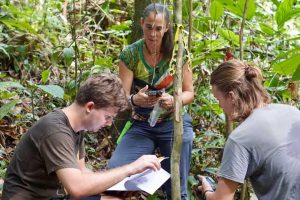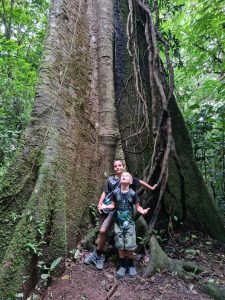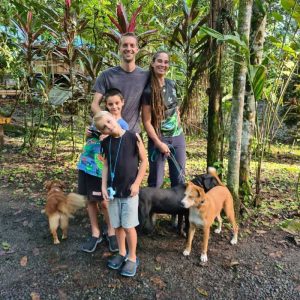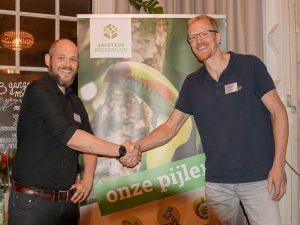Little feet, big steps
A family adventure at Adopt Rainforest
by Zoë Schreurs
World Family Day, also known as International Family Day, is celebrated worldwide on May 15 to recognize the value of family bonds and family relationships. This day emphasizes support, love and cooperation within families.
While we at “Adopt Rainforest” are of course all a little bit of a family, today we want to highlight a special family within our organization. This young couple, accompanied by their two young adventurers, moved to Costa Rica and are committed day and night to rainforest conservation. I spoke with Hanneke, the wife of co-founder Maarten. Hanneke is a force in her own right and her dedication and enthusiasm are indispensable to our foundation, as every volunteer and student will attest.
Hanneke, tell us something about yourself?
Like Maarten, I am a Master in Biology. My main task here is to guide the students and so I am their main point of contact. I support them in everything that has to do with school and conduct interviews with internship supervisors, but of course there is much more to it. We receive many young people who are away from home for a longer period of time for the very first time, and this sometimes bothers them. Moreover, there are quite a few management tasks involved: making sure that the accommodations are in good condition, supervising our cook Maria and other people, preparing the bookkeeping and often also the less fun jobs like taking care of the groceries, cleaning, and so on.
Together with our guide Gerald, I am leading a long-term research project in collaboration with Utrecht University. We are investigating the long-term effects of land use on rainforest development, with a focus on species diversity and CO2 uptake by trees. And that’s quite a job. In total, we have to set out 25 plots, in which we measure, geotag, classify and annually monitor every tree of a certain thickness. In this way, we want to study how different types of soils develop and what ecosystem services they provide. With this, we want to lead the way in international research and pass on useful insights to other conservation organizations.
I greatly enjoy the time I spend with the students in the forest. Upon arrival, they are often a bit uncomfortable and unsure because everything is new: the culture, the language, the customs and the climate. It requires quite a bit of adjustment for the students. But precisely because of these challenges, I see them grow and blossom, not only as future researchers, but also as individuals. It is very beautiful to be able to participate in that development.
Protecting rainforest in Costa Rica was first and foremost the big dream of your husband Maarten and his childhood friend Matthijs.
From their college days, Maarten and Matthijs dreamed about protecting the rainforest. I thought, we’ll see what happens, after all, life is full of twists and turns: graduating, starting a family, traveling….
In 2008, the time finally came: Maarten, Matthijs and I left for Costa Rica. But it was not an easy start. During that period I became very ill, later it turned out to be thyroid problems. While Maarten and Matthijs returned enthusiastically with stories of their adventures, I struggled with hormone imbalances and felt miserable. Fortunately, Maarten and I could always talk about it very openly. I needed some time to get used to the idea. Of course, we had to leave everything behind in the Netherlands. Around age 30, everyone around me started to settle down. The idea of working for a lifetime just to pay off a mortgage felt oppressive to me. So it was nice that we had such a big adventure ahead of us.
Costa Rica got a retake in 2015, when we returned for a month with our toddler. It was reassuring to realize that for a child, the country does not matter, as long as there is love and care from the parents. This brought me peace of mind.
In the summer of 2017, we tied the knot and left, with our toddler and a 9-month-old baby. Maarten had to set up everything from the foundation, running from place to place because my Spanish was not good enough to handle that administration. Meanwhile, I stayed home with the kids. Sometimes I felt a bit isolated, with no friends or family around. On the other hand, I don’t know many people who can spend so much time with their children. That is really a gift. Meanwhile, we have been here for 7 years and I wouldn’t dream of returning already. By now, we also have our dogs Pieter, Lola and Zeus here!
For your children, of course, this is a very different childhood than for other Dutch children.
The Netherlands is a vacation country for our boys. When we visit, it is usually nice and warm, they get all the candy and attention from the grandmas and grandpas, and we do all kinds of fun things. We explained to them at one point that if we lived in Holland, life would go its usual way there too with school and work. Just like here. Our son Abel does not want to go back to the Netherlands, he wants to stay in Costa Rica for the rest of his life. Luuk, on the other hand, wants to travel and live in as many countries as possible. The urge to explore has been instilled in them.
I also think Abel will do something in the natural sciences later on. His passion when it comes to animals and nature is immense. It is wonderful to see how he immediately shoots into the role of guide to other Dutch children and volunteers as well. His happiness radiates when he can teach others about nature, and then he is unstoppable. He will also frequently ask, “Is this a new species mom?”. They naturally get my enthusiasm when I find a new butterfly, for example.
Luuk is also very inquisitive, but with him it shows itself more in an interest in the universe and black holes. They often talk about our work at school. They have every opportunity to learn here, both in nature, but also their school situation is unique. They are now raised trilingual, with a broad base of Dutch, English and of course Spanish. Luuk is 7 and now gets Portuguese on top of that. The days are hectic though, as of 5 am the daily rush starts to get the boys on the school bus on time. And as soon as they have left, the research work starts for us, together with the students.
The boys also grow up among the students. They have had to learn that these come and go. Unlike grandmothers and grandfathers, although we see them less often, of course they remain a constant.
What do you hope your children remember from this whole adventure?
Actually kind of the same thing that we want to pass on to the students, how beautiful and valuable nature is. That you have to cherish it, because like many people, our children are also quite materialistic. Then I think, what good is all that stuff, look around you! Of course, the languages and the contacts with the volunteers and students are also nice. I think there is no better way to learn about people. Of course, the most important thing remains that they become happy and start doing something they like. We are doing all of that. Pura Vida, we try to live a pure life here, close to nature and enjoy it as much as we can.
Want to read more about the Adopt Rainforest Foundation?


 on with Utrecht University. The foundation was ready for a new step to professionalize the research project and Utrecht University was looking for a stable and reliable partner in Central America to conduct solid research in the rainforest. So for both parties this is a wonderful collaboration! Because of this we will make a big step in professionalizing our current research on biodiversity in our reserve. Together with the visiting students we will focus on scientific research in which the diversity and development of nature in our reserve, with an emphasis on flora, is central.
on with Utrecht University. The foundation was ready for a new step to professionalize the research project and Utrecht University was looking for a stable and reliable partner in Central America to conduct solid research in the rainforest. So for both parties this is a wonderful collaboration! Because of this we will make a big step in professionalizing our current research on biodiversity in our reserve. Together with the visiting students we will focus on scientific research in which the diversity and development of nature in our reserve, with an emphasis on flora, is central.